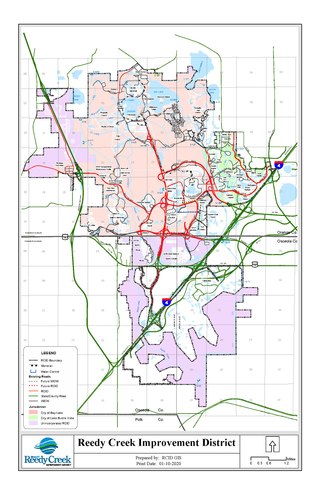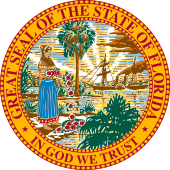
The Central Florida Tourism Oversight District (CFTOD), formerly the Reedy Creek Improvement District (RCID), is the governing jurisdiction and special taxing district for the land of Walt Disney World Resort. It includes 39.06 sq mi (101.2 km2) within Orange and Osceola counties in Florida. It acts with most of the same authority and responsibility as a county government. It includes the cities of Bay Lake and Lake Buena Vista, as well as unincorporated land.

Charles Joseph Crist Jr. is an American attorney and politician who served as the 44th governor of Florida from 2007 to 2011 and as the U.S. representative for Florida's 13th congressional district from 2017 to 2022. Crist has been a member of the Democratic Party since 2012; he was previously a Republican before becoming an independent in 2010.
The timeline of women's legal rights (other than voting) represents formal changes and reforms regarding women's rights. The changes include actual law reforms, as well as other formal changes (e.g. reforms through new interpretations of laws by precedents). The right to vote is exempted from the timeline: for that right, see Timeline of women's suffrage. The timeline excludes ideological changes and events within feminism and antifeminism; for that, see Timeline of feminism.
This is a timeline of reproductive rights legislation, a chronological list of laws and legal decisions affecting human reproductive rights. Reproductive rights are a sub-set of human rights pertaining to issues of reproduction and reproductive health. These rights may include some or all of the following: the right to legal or safe abortion, the right to birth control, the right to access quality reproductive healthcare, and the right to education and access in order to make reproductive choices free from coercion, discrimination, and violence. Reproductive rights may also include the right to receive education about contraception and sexually transmitted infections, and freedom from coerced sterilization, abortion, and contraception, and protection from practices such as female genital mutilation (FGM).

The legality of abortion in the United States and the various restrictions imposed on the procedure vary significantly depending on the laws of each state or other jurisdiction. Some states prohibit abortion at all stages of pregnancy with few exceptions, others permit it up to a certain point in a woman's pregnancy, while others allow abortion throughout a woman's pregnancy. In states where abortion is legal, several classes of restrictios on the procedure may exist, such as parental consent or notification laws, requirements that patients be shown an ultrasound before obtaining an abortion, mandatory waiting periods, and counselling requirements. Abortion laws tend to be the most strict in the Southern United States and the most lenient in the Northeastern and Western United States.

Lesbian, gay, bisexual, and transgender (LGBT) people in the U.S. state of Florida face legal challenges not experienced by non-LGBT people. Same-sex sexual activity became legal in the state after the U.S. Supreme Court's decision in Lawrence v. Texas on June 26, 2003, and same-sex marriage has been legal in the state since January 6, 2015. Discrimination on account of sexual orientation and gender identity in employment, housing and public accommodations is outlawed following the U.S. Supreme Court's ruling in Bostock v. Clayton County. In addition, several cities and counties, comprising about 55 percent of Florida's population, have enacted anti-discrimination ordinances. These include Jacksonville, Miami, Tampa, Orlando, St. Petersburg, Tallahassee and West Palm Beach, among others. Conversion therapy is also banned in a number of cities in the state, mainly in Palm Beach County and the Miami metropolitan area.

Ronald Dion DeSantis is an American politician serving since 2019 as the 46th governor of Florida. A member of the Republican Party, he represented Florida's 6th congressional district in the U.S. House of Representatives from 2013 to 2018. DeSantis is a candidate in the 2024 United States presidential election.

A six-week abortion ban or early abortion ban, called a "heartbeat bill" or "fetal heartbeat bill" by proponents, is a form of abortion restriction legislation in the United States. These bans make abortion illegal as early as six weeks gestational age, which is when proponents claim that a "fetal heartbeat" can be detected. Medical and reproductive health experts, including the American Medical Association and the American College of Obstetricians and Gynecologists, say that the reference to a fetal heartbeat is medically inaccurate and intentionally misleading because a conceptus is not called a fetus until after ten weeks of pregnancy, before which the proper term is an embryo, as well as that at six weeks the embryo has no heart, which at that stage is only a group of cells which will become a heart. Medical professionals advise that a true fetal heartbeat cannot be detected until around 17 to 20 weeks of gestation when the chambers of the heart have become sufficiently developed.
Abortion in Oklahoma is illegal unless the abortion is necessary to save the life of a pregnant woman.
Anti-LGBT curriculum laws, sometimes referred to as "Don't Say Gay" laws, are laws approved by various U.S. states that prohibit or limit the mention or discussion of homosexuality and transgender identity in public schools, especially in younger grades. In theory, these laws mainly apply to sex ed courses, but they can also be applied to other parts of the school curriculum as well as to extracurricular activities such as sports and organizations such as gay–straight alliances. In July 2022, a wave of anti-LGBT curriculum resurgence saw ten such laws beginning to take effect in six different states. Some states enacting these new laws appear to have mirrored similar laws from other states.

Joe Gruters was the Chairman of the Florida Republican Party from 2018 to 2022, and is a member of the Florida Senate representing the 22nd District, which consists of Sarasota County and part of Charlotte County. He was previously a member of the Florida House of Representatives. Earlier in his career, Gruters worked on the campaign of U.S. Rep. Vern Buchanan as campaign manager and was vice chairman of the Republican Party of Florida and chairman of the Republican Party of Sarasota.

Anna Vishkaee Eskamani is an American politician who is the member of the Florida House of Representatives from the 47th district in Orange County from 2018. She is the first Iranian American in the Florida legislature. Eskamani is a member of the Democratic Party supporting abortion rights, increased gun control, increasing expenditures on public education, and increasing environmental regulations such as a banning plastic bags. She has worked for Planned Parenthood.

The 2024 United States presidential election will be the 60th quadrennial presidential election, scheduled for Tuesday, November 5, 2024. Voters will elect a president and vice president for a term of four years. Incumbent President Joe Biden, a member of the Democratic Party, is running for re-election. His predecessor Donald Trump, a member of the Republican Party, is running for re-election to a second, nonconsecutive term. A number of primary election challengers have also declared their candidacies for the nomination of both major parties. The winner of this election is scheduled to be inaugurated on January 20, 2025.
Abortion in Louisiana is mostly illegal as of August 1, 2022.
Abortion in Ohio is legal through 22 weeks of pregnancy.
Since 1989, the Florida Supreme Court has held that Article 1, Section 23 of the Florida Constitution protects access to abortion. This means that, despite the United States Supreme Court's decision in Dobbs v. Jackson Women's Health Organization, abortion remains legal in Florida. However, on April 13, 2023, the Florida Legislature passed and Governor DeSantis signed into law the Heartbeat Protection Act, which outlaws abortion after 6 weeks, with exceptions for rape, incest, human trafficking, a diagnosis of a fatal fetal abnormality, and when required to save the pregnant woman’s life or protect her health. The Act takes effect if the state Supreme Court upholds the 15-week ban, currently being challenged.
The political positions of Ron DeSantis have been recorded from his 2012 United States House of Representatives elections and his tenure as Representative, the 2016 United States Senate election in Florida, and during his tenure as governor of Florida. DeSantis is considered a conservative Republican.

The Parental Rights in Education Act, commonly referred to as the "Don't Say Gay" law, is a Florida state law passed in 2022 that regulates public schools in Florida. The most controversial sections of the act prohibit public schools from having "classroom discussion" or giving "classroom instruction" about sexual orientation or gender identity from kindergarten through third grade or in any manner deemed to be against state standards in all grades; prohibits public schools from adopting procedures or student support forms that maintain the confidentiality of a disclosure by a student, including of the gender identity or sexual orientation of a student, from parents; and requires public schools to bear all the costs of all lawsuits filed by aggrieved parents.
Andrew Howard Warren is an American prosecutor and politician who has been the state attorney for Florida's 13th Judicial Circuit, Hillsborough County since 2017. In August 2022, Florida Governor Ron DeSantis suspended Warren; he remains state attorney as he challenges the suspension in court, with a DeSantis-appointed acting state attorney operating the office. Warren was previously a federal prosecutor in the fraud division at the United States Department of Justice.

Ron DeSantis has served as the 46th governor of Florida from 2019. As governor, DeSantis resisted taking many of the measures to slow the spread of COVID-19 that various other state governments implemented, such as face-mask mandates, stay-at-home orders, and vaccination requirements. During the pandemic, Florida experienced above-average economic growth. DeSantis cut state-government spending, which, combined with federal stimulus payments and high sales-tax revenue, led to the largest budget surplus in Florida history. He engaged in recovery efforts after Hurricane Ian and Hurricane Nicole, and oversaw the passage of the controversial Parental Rights in Education Act. He was reelected in a landslide in the 2022 Florida gubernatorial election; his 19.4% margin of victory over Charlie Crist was the state's largest in 40 years.












